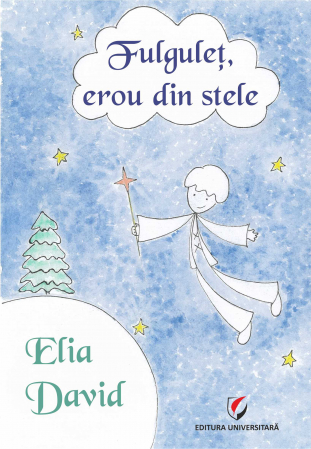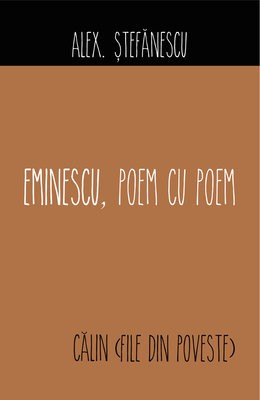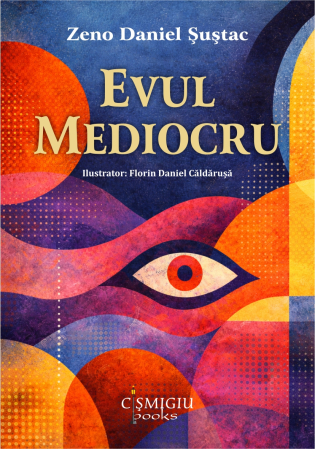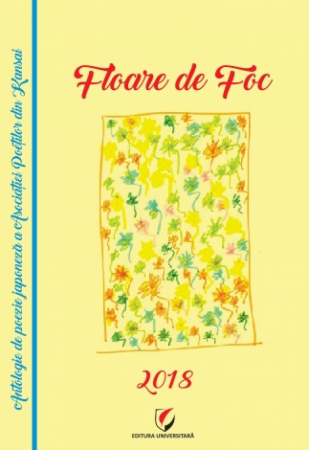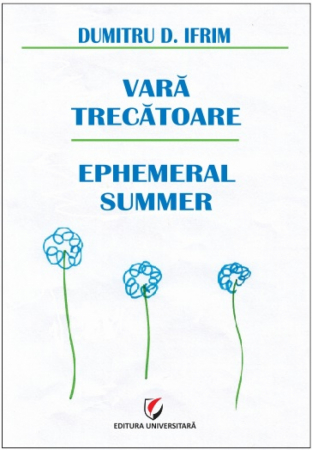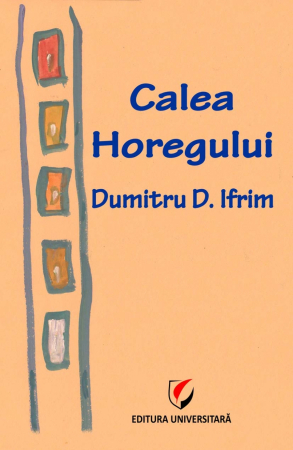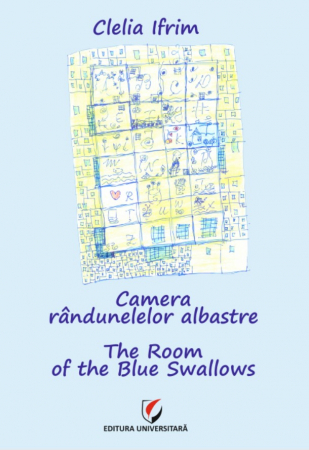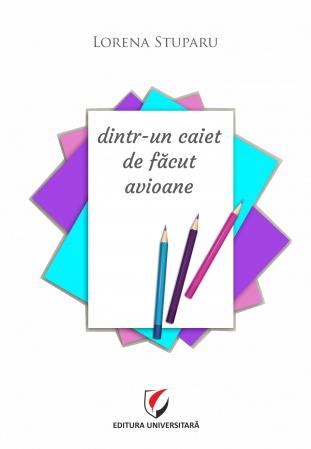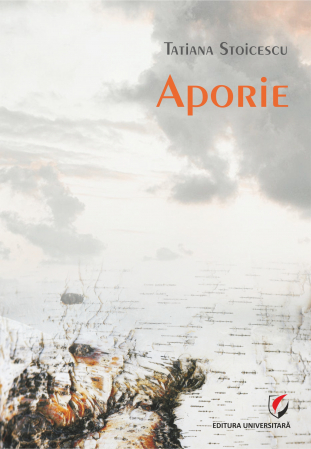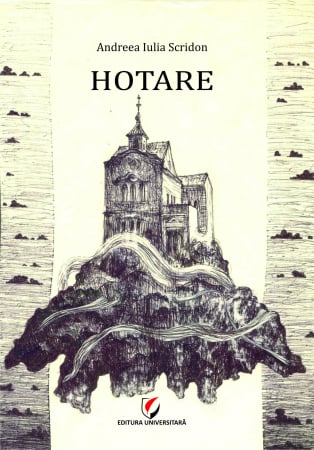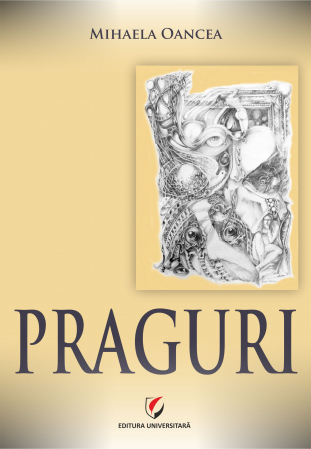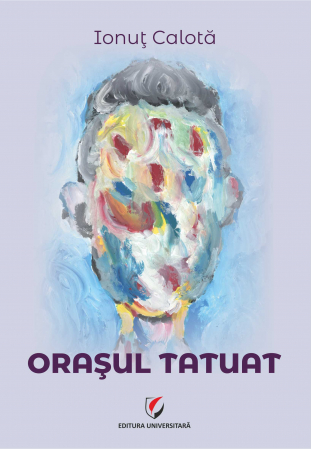Manuscript proposals: [email protected] / 0745 204 115 //// Tracking orders Individuals / Sales: 0745 200 357 / Orders Legal entities: 0721 722 783
ISBN: 978-606-28-1508-0
DOI: 10.5682/9786062815080
Publisher year: 2022
Edition: I
Pages: 204
Publisher: Editura Universitară
Author: Paula Barsan
Product Code:
9786062815080
Do you need help?
0745 200 357
- Description
- Download (1)
- Authors
- Content
- More details
- Reviews (0)
You have a touch of immortality in my birth.
Hide the peace in my lap
To spin my stars wholesale.
Rainbow speaking to you, light with your palms
Through my veins I run ragged.
Patches in jeans, clouds are flowing.
In Paula Barsan's poetry, there is a permanent peeling of words, of deepening the meaning by polishing, by ennobling (...) then ordering them in a spiral of light, a poetic approach also found in the previous volumes.
Paula Barsan grows on a dimension of a neomodernist lyricism, flooded with youthful élan, the vitality of creation through the word, springing smiles, peeling reality to discover its strong essences, here is a way of making poetry as purification through writing, a catharsis returned to strength , after the experiment of notational poetry, after the avalanche of everyday life, of frugal, direct, inoperable notation.
Elena Netcu
Hide the peace in my lap
To spin my stars wholesale.
Rainbow speaking to you, light with your palms
Through my veins I run ragged.
Patches in jeans, clouds are flowing.
In Paula Barsan's poetry, there is a permanent peeling of words, of deepening the meaning by polishing, by ennobling (...) then ordering them in a spiral of light, a poetic approach also found in the previous volumes.
Paula Barsan grows on a dimension of a neomodernist lyricism, flooded with youthful élan, the vitality of creation through the word, springing smiles, peeling reality to discover its strong essences, here is a way of making poetry as purification through writing, a catharsis returned to strength , after the experiment of notational poetry, after the avalanche of everyday life, of frugal, direct, inoperable notation.
Elena Netcu
-
Catharsis
Download
PAULA BARSAN
Confession on steps of light in the volume Catharsis, by Elena Netcu / 15
1. Declaration of love / 22
2. Centurion / 23
3. Paradox / 24
4. Marigold / 25
5. Sacrosanct / 26
6. Timeless / 27
7. Theurgist / 28
8. Candori / 29
9. Cosmogony / 30
10. Vanguard / 31
11. From tomorrow / 32
12. Ascension / 33
13. Decanted twilight / 34
14. Limits / 35
15. Triumph / 36
16. Condemned / 37
17. Chancery of the minute / 38
18. Catharsis / 39
19. Love kills, does not die / 40
20. Insomnia / 41
21. Elle / 42
22. Trap / 43
23. Twilight / 44
24. Effervescent / 45
25. Incandescence / 46
26. Indiscretion / 47
27. Compass / 48
28. Electric / 49
29. Cavalcade of the second / 50
30. S.O.S. / 51
31. Answer / 52
32. The stopped fruit / 53
33. Sentimental / 54
34. Apotheotic / 55
35. Youth / 56
36. Retro / 57
37. Cinematic / 58
38. Cosmos flower / 59
39. Metamorphosis / 60
40. Unhappiness / 61
41. Cashmere / 62
42. Art / 63
43. The wink / 64
44. Introspection / 65
45. Eternity / 66
46. Radiant / 67
47. Quadrilateral / 68
48. Alpine / 69
49. Whisper / 70
50. Allure / 71
51. Late Spring / 72
52. Shine / 73
53. Eden / 74
54. Ecstasy / 75
55. Sagrada Familia / 76
56. Hesitation / 77
57. Obsession / 78
58. Algorithm / 79
59. Apricot / 80
60. Immaculate / 81
61. Ballet / 82
62. We measure / 83
63. February / 84
64. Liquor / 85
65. Matte / 86
66. Story on fire / 87
67. Siesta / 88
68. Gust / 89
69. Black Clouds / 90
70. Gunpowder / 91
71. Abyss / 92
72. Anodizing / 93
73. Case report / 94
74. Whim / 95
75. No blush / 96
76. Generator / 97
77. Deduplication / 98
78. Crochiu / 99
79. Reflux / 100
80. Daring / 101
81. Sky / 102
82. Certainty / 103
83. Maundy Thursday / 104
84. Genius / 105
85. Sprint / 106
86. War / 107
87. Anodize the years / 108
88. Photo workshop / 109
89. Irremediable / 110
90. Inseparable / 111
91. Economic and financial analysis / 112
92. Looping / 113
93. Evidence / 114
94. May in the calendar / 115
95. Bypass 360 / 116
96. Escape / 117
97. Interrogation / 118
98. Unconventional / 119
99. Copts / 120
100. Stellar / 121
101. Nautical / 122
102. Vitriole / 123
103. The spoken point / 124
104. Chronos / 125
105. Prosody / 126
106. Summer / 127
107. Message / 128
108. Pride / 129
109. Rust / 130
110. Shivers / 131
111. Sadness / 132
112. Sonnet / 133
113. Popes / 134
114. Eva / 135
115. Sunday / 136
116. Infinity / 137
117. Slice of me / 138
118. Hologram / 139
119. Lock / 140
120. Escape / 141
121. Only the infinite / 142
122. Forgiveness / 143
123. We tie the knot / 144
124. Innocence / 145
125. Your silence / 146
126. Stamp / 147
127. There is / 148
128. The Penance Script / 149
129. Verosimil green / 150
130. Empire of Life / 151
131. Rain of the fountain / 152
132. Vacation in Rome / 153
133. Sistine Chapel / 154
134. The virtue of the earth / 155
135. Paradise / 156
136. Tournament / 157
137. Question / 158
138. Sunset / 159
139. Yellow / 160
140. Encryption / 161
141. Clover / 162
142. Eternals / 163
143. Age / 164
144. Sincerity / 165
145. Budding / 166
146. Chromatique / 167
147. Cast / 168
148. Acoustics / 169
149. Amen / 170
150. Gesture / 171
151. Ordinance / 172
152. East West / 173
153. 26 April / 174
154. Seduced / 175
154. Fertile / 176
155. Spatiality / 177
156. Vespers / 178
157. Second / 179
158. Energy / 180
159. Candle / 181
160. Fading / 182
161. Akathist / 183
162. Twilight cornered / 184
163. Pulsatil / 185
164. Ragged / 186
165. Anathema / 187
167. Trivial / 188
168. Attitude / 189
169. Enigma / 190
170. Metaphysics / 191
171. Crenellation / 192
172. Unmasking / 193
173. Anger / 194
174. Wave / 195
175. Borders / 196
176. Blue / 197
177. Irony / 198
178. Theatrical / 199
179. Destiny / 200
180. Acceptance / 201
181. Urge / 202
1. Declaration of love / 22
2. Centurion / 23
3. Paradox / 24
4. Marigold / 25
5. Sacrosanct / 26
6. Timeless / 27
7. Theurgist / 28
8. Candori / 29
9. Cosmogony / 30
10. Vanguard / 31
11. From tomorrow / 32
12. Ascension / 33
13. Decanted twilight / 34
14. Limits / 35
15. Triumph / 36
16. Condemned / 37
17. Chancery of the minute / 38
18. Catharsis / 39
19. Love kills, does not die / 40
20. Insomnia / 41
21. Elle / 42
22. Trap / 43
23. Twilight / 44
24. Effervescent / 45
25. Incandescence / 46
26. Indiscretion / 47
27. Compass / 48
28. Electric / 49
29. Cavalcade of the second / 50
30. S.O.S. / 51
31. Answer / 52
32. The stopped fruit / 53
33. Sentimental / 54
34. Apotheotic / 55
35. Youth / 56
36. Retro / 57
37. Cinematic / 58
38. Cosmos flower / 59
39. Metamorphosis / 60
40. Unhappiness / 61
41. Cashmere / 62
42. Art / 63
43. The wink / 64
44. Introspection / 65
45. Eternity / 66
46. Radiant / 67
47. Quadrilateral / 68
48. Alpine / 69
49. Whisper / 70
50. Allure / 71
51. Late Spring / 72
52. Shine / 73
53. Eden / 74
54. Ecstasy / 75
55. Sagrada Familia / 76
56. Hesitation / 77
57. Obsession / 78
58. Algorithm / 79
59. Apricot / 80
60. Immaculate / 81
61. Ballet / 82
62. We measure / 83
63. February / 84
64. Liquor / 85
65. Matte / 86
66. Story on fire / 87
67. Siesta / 88
68. Gust / 89
69. Black Clouds / 90
70. Gunpowder / 91
71. Abyss / 92
72. Anodizing / 93
73. Case report / 94
74. Whim / 95
75. No blush / 96
76. Generator / 97
77. Deduplication / 98
78. Crochiu / 99
79. Reflux / 100
80. Daring / 101
81. Sky / 102
82. Certainty / 103
83. Maundy Thursday / 104
84. Genius / 105
85. Sprint / 106
86. War / 107
87. Anodize the years / 108
88. Photo workshop / 109
89. Irremediable / 110
90. Inseparable / 111
91. Economic and financial analysis / 112
92. Looping / 113
93. Evidence / 114
94. May in the calendar / 115
95. Bypass 360 / 116
96. Escape / 117
97. Interrogation / 118
98. Unconventional / 119
99. Copts / 120
100. Stellar / 121
101. Nautical / 122
102. Vitriole / 123
103. The spoken point / 124
104. Chronos / 125
105. Prosody / 126
106. Summer / 127
107. Message / 128
108. Pride / 129
109. Rust / 130
110. Shivers / 131
111. Sadness / 132
112. Sonnet / 133
113. Popes / 134
114. Eva / 135
115. Sunday / 136
116. Infinity / 137
117. Slice of me / 138
118. Hologram / 139
119. Lock / 140
120. Escape / 141
121. Only the infinite / 142
122. Forgiveness / 143
123. We tie the knot / 144
124. Innocence / 145
125. Your silence / 146
126. Stamp / 147
127. There is / 148
128. The Penance Script / 149
129. Verosimil green / 150
130. Empire of Life / 151
131. Rain of the fountain / 152
132. Vacation in Rome / 153
133. Sistine Chapel / 154
134. The virtue of the earth / 155
135. Paradise / 156
136. Tournament / 157
137. Question / 158
138. Sunset / 159
139. Yellow / 160
140. Encryption / 161
141. Clover / 162
142. Eternals / 163
143. Age / 164
144. Sincerity / 165
145. Budding / 166
146. Chromatique / 167
147. Cast / 168
148. Acoustics / 169
149. Amen / 170
150. Gesture / 171
151. Ordinance / 172
152. East West / 173
153. 26 April / 174
154. Seduced / 175
154. Fertile / 176
155. Spatiality / 177
156. Vespers / 178
157. Second / 179
158. Energy / 180
159. Candle / 181
160. Fading / 182
161. Akathist / 183
162. Twilight cornered / 184
163. Pulsatil / 185
164. Ragged / 186
165. Anathema / 187
167. Trivial / 188
168. Attitude / 189
169. Enigma / 190
170. Metaphysics / 191
171. Crenellation / 192
172. Unmasking / 193
173. Anger / 194
174. Wave / 195
175. Borders / 196
176. Blue / 197
177. Irony / 198
178. Theatrical / 199
179. Destiny / 200
180. Acceptance / 201
181. Urge / 202
Catharsis - a fundamental category of aesthetics
or the poetic effects of the will to express the inexpressible *
*Paula BARSAN, CATHARSIS, University Publishing House, Bucharest, 2022
Peter ISACHI
Motto:
"Our place is somewhere between being and non-being,
between two fictions" (Emil Cioran)
Aesthetically speaking, Paula Barsan is in the volume Catharsis, a Dada-surrealist poet, who dreams of expressing the inexpressible, although she senses the lack of the right word - the one capable of representing her inexpressible thought -, so that she permanently assumes the risk of surprising herself, due to the lack of words, inferior to himself. I wonder if in relation to the vocabulary, to the spirit of a language, to the style, we are not permanently inferior to ourselves, although language should not be interpreted as the matter/substance of the literary work, but as its model, linguistically structured. The author lives, speaking poetically, programmed against aesthetic dogmas, loves poetic nihilism unconditionally, but at the same time wants to reveal absolute truths and values, so she chooses, in the last instance, as a solution, a new order of poetics, which ensure a full development of the existential (i)rational. The nonconformist writer would have been received with delight at the Cabaret Voltaire, for the poetics of the unpredictable juxtapositions of words, for the illusion of liberating poetics and poetics from the control of aesthetic reason and the recurrence of literary currents, for the will to grant the word an Urmuzian freedom, and above all , for detaching katharsis (gr. – purification) from the authority of Aristotelian poetics. In the spirit of Dadaist improvisation and Dada anti-poetics, the Bacauan poet continues the futurists/lettrists and the surrealists, involving in her writing according to compositional needs, hazard, verbal innocence, a certain stylistic/semiotic mechanics, the tendency to unanticipate poetry, Mallarmean hermeticism, a randomness disorder of spirit etc. Everything, it seems, to demonstrate the obsolescence and vanity of the traditional poetic act, in such a way that the "new poem" - the poet seems haunted by the stereotype of the new - no longer reminds of classicism, romanticism, baroque, expressionism, etc. or other aesthetic intentions of poeticizing used by predecessors, although the brilliant Eminescu said: "everything is old and everything is new".
This does not mean that the new wave, represented in the present case by Paula Barsan, cannot remelt a poetic alter Ego, apparently new, and place it "between being and non-being, between two fictions", as he would happily say Cioran:
"My soul is a forerunner/ Through your shriveled smile,/ Barely ignited./ You shine a seaweed far away/ In the cruel clear/ You gather the oasis of dreams,/ Cool rocks surprise./ From wrinkled waves, sometimes cold,/ You melt an ego."( Vanguard);
"The sentence of the gaze/ Divides the past time./ Calling the awakened eyelid/ Conquering the oval call, towards the arched,/ Codex on time." (Cosmogony); "What a sad poem/ You lifted me up to the sky/ Mystery I call,/ Melted by it." (Candle).
Paula Barsan's neo-avant-garde poetics aims to represent, configure through word, sign, plasticizing/revealing metaphor, symbol, myth, a drifting, incoherent, chaotic, floating, polychromatic and polyphonic (im)reality. Of course, it is not the reflection of this reality that interests her, but its sublimation through the sonorous inanity of the words. It is known, the word does not, cannot, encompass the reality it claims. As all words have the same essential lack of meaning, an authentic/total communication with the Other, with the World, with yourself is impossible. The insinuation of the tragic - and, simultaneously, of the other aesthetic categories: poetic, beautiful, ugly, absurd, comic, magical, fantastic, etc. - it is fatal and implies the immanence of catharsis. In this sense, the title of the volume, Catharsis, is an ingenious, eloquent and Aristotelian choice. It suggests and argues that contemporary aestheticians have extended the sphere of catharsis to the entire field of Arts, in all its forms (not only to tragedy, as was commented in Aristotelian Poetics), considering it as a general category of aesthetics. Now, in postmodernity, when catharsis, the general category of aesthetics, is omnipresent, Lessing's point of view is truly reconfirmed. The concept of "katharsis" used by Aristotle, in his polemic with Plato, in the famous Poetics - arousing pity and fear commits the characteristic purification of such emotions - is redefined by Lessing in the Hamburg Dramaturgy and seen as "a transformation of passions into virtuous inclinations". So, let's try to penetrate either the "purification" or the possible "virtuous inclinations" of the book, which we will suggest by randomly quoting the poems on p. 24 and p. 25, in order to notice how in the world our polyphony, everything communicates and communicates:
"Shell, snail of silence/ Tentacles caress the sunset/ Raise mirrors in prayer through rays of light,/ Revive suspicious smiles/ Suspended in the Andes/ Through stained glass windows of the sky./ Cherubs banished to the bourgeois color/ By tears and lacustrine pressure,/ Over carnal fish temptations gone./ They take voluptuous power, they want it and take it/ To penitence in the divine./ They remain crucified looking at destiny." (Paradox); "Leave me a dream in the clouds./ Course from the sky of the gaze/ Negative forgetfulness./ Twilight with hot eyes/ Adjust borders,/ From your path I ran like a madwoman,/ Waiting for you to defeat orange,/ Day." (Craita)
The poet's preference for free verse and white verse helps her poetically and poetically, in scanning the surreal, that is, of multiple subliminal, ineffable states, of seemingly disinterested games of poetic thinking, but also of the mysterious existential sleep, of the unconscious, the dreamlike, the uncreated , in a random summation of the most unexpected antinomies, more precisely, a summation of immanences that configure a living act of interlocution that confirms the author's liberation from Bacovianism, Eminismianism, Arghesianism, Voiculescianism, etc.:
"I'm afraid I won't fall asleep/ Your dream,/ I feel good in it./ I hope for an inopportune moment taken by surprise,/ Aikido the word in fate/ A secondary." (Centurian); "My longings flutter lonely/ It shouts and calls summer fringes./ Knees bent in the kiss of silence/ For more warmth,/ Asymptote calls you,/ Distance to be." (Limits); "You flow the infinite./ Sunrises overflowing waves/ Of impotent hotness./ Throbbing in sound on the clapboard/ With your phalanges of thoughts,/ Break through dancing whispers/ To the remaining shard of soul." (Vitriol)
The surreal transfigured by Paula Barsan is also defined by Michael Carrouges. He is not confused with the unreal, but "is the living synthesis of the real and the unreal, the immediate and the virtual, the banal and the fantastic". The peculiarity of the poetics of the Catharsis volume (the interference of seemingly irreducible contradictions: subjective and objective; real - fictional, being - non-being, seen - unseen, etc.) can also be found in the volumes published by the Letras Publishing House: Entropia, Aspiratie, Sui-Generis, etc. and consists in a continuous Baudelaire correlation between poles, between opposites, following the principle of correspondences and possible universal analogies. I am quoting from volume Entropia, but also from Catharsis, asking the reader to notice the confluent aesthetic benefits, with the poetics of Blagian silence, but also with the poetics of light:
"I give you a church / Of your deeds./ Of perfect smiles/ And mute./ Live, but sad, deep down./ Not unhappiness in love./ Too many have it./ Gold, like a card,/ Without pin / And still vocally fluttering, / Almost in vain, odalisques gone, / After a chance immovable by the void". (Silence); "Over hearts of glass/ Behind the scenes of emotion/ Suspend the distance./ Burn the shores./ In flights you count/ Lift the shutters of impotence,/ Duel of light, End of eternity,/ Be." (Ragged)
To any aesthetic convention established by tradition, the poet P.B. prefers the disinterested game of poetic thinking, which cultivates all forms of subversive freedom against the common consciousness and its laws, so that the self becomes equivalent to the will to encompass the Totality - a romantic trait. This presupposes, on the one hand, a negation of the self, of personal originality, and on the other hand, a projection of the self, into the infinity of the imaginary - according to A. Breton, what tends to become real:
"Unwrapped fondants float,/ Solar balloons that took color/ From your four drawers,/ Now in the scan./ The emotion of the star is read to them/ The sigh of longing, the agreement to fly,/ Gifted calls of the cockpit. / I touched the simulacrum with the pen/ Scrolling an echo." (Effervescent); "The dawn pierces the nomadic innocence,/ Shackles breaking over the eyelids of the sky,/ Blows their audacity into a cosmos flower/ visceral high call of the sunrise on the door,/ An infectious rain-in touching hearts,/ Spices of thick dew in the luger, ignite euphoric suns,/ Longing for the immensity welded by whispers/ Untrammeled is yesterday's dream." (Cavalcade of the second)
Paula's poetry, conceived in the purest Breton vision, suggests a great disintegrating power. The author resorts to abysmal suggestions, to a subliminal noology, to the breaking of language patterns, to poetic syntax, to a permanent recreation of language and the order of rhetoric/poetics, to a recreation of a plenary, cosmogonic imaginary, to a revelation of the communicative effects of chance , intentionally avoiding the sclerosed, institutionalized forms of previous poetic doctrines. The reader will have already noticed that the imaginary is radically "something else", detached from the Nichitian poetic paradigm, from "Necuvintele", from "Knots and signs", "11 Elegies" or that of Ion Barbu, from "Second Game":
"Contagious, neuralgic, sharp in the night/ Warm versatility./ You asked for rescue by pedaling the amazement./ You directed the spark of eternity in the morning./ Curved dew-awakening,/ Convex fragility to the painful/ Healed by a star,/ It is our passage." (S.O.S.); "An arm towards the boundless/ It calls for touches of the sky./ The second rustles/ Spidering, gold flows from the sky./ I tie the starfish to the Great Chariot,/ We fly with it." (Borders)
Catharsis, a fundamental category of (post)modern aesthetics, ubiquitous in writing, confirms the epiphany of a poetic discourse that is not arbitrary, as it seems at a superficial glance, in which the poetic - the predominant aesthetic category, in a musical-symphonic connection with the tragic, the absurd , the comic, the beautiful, the ugly, etc. - it is irreducible to the transfigured literary fact in the absence of its coincidence with a specific reality/real. In the spirit of a (neo)surrealism that the poet proposes to the reader, the writing offers us a chaotic revelation of the inner lives, in a poetic-tragic symphony of the destiny of man at war with himself, in an atypical, unmistakable writing, which -and carries its specific spatial and temporal horizon, only in itself, although poetry is not only a solipsistic act.
"Catharsis", although it is a work of neo-avant-garde art - with roots in futurism, dadaism, surrealism, expressionism, letrism -, transfigures existential experiences in itself and for itself, in a cosmoid configuration, as the philosopher Lucian Blaga would say.
Only such a configuration - in itself and for itself, of "cosmoid" - justifies the lines selected on the IV cover, by Elena Netcu, the foreword of the volume: "You have a touch of immortality in my birth/ Hide the peace in my lap/ His I spin my stars./ Rainbow speaking to you, with your palms the light/ Through your torn veins I caress/ Patches in your jeans, clouds flow to you." Ecce Homo – 2023! His only element of novelty compared to the Christian man: the jeans with many, many "ragged" holes... Wasn't Aristotle right when he claimed that "Poetry is more philosophical and nobler than History"? Let's not forget: nature/history that wants and perpetuates discord, the conflicting state, the war "each against all", is the one that offers the poet the absolutely necessary chaos. It is known, without the eternal-preliminary chaos there is no poetry/creation. Let's remember how and where the Creation of the world begins. The myth of genesis reaffirms the poetics of the continuous beginning/end. In the opinion of the poor critic, poetry is like a beautiful woman. It must be constantly conquered and recaptured, although it is always within us. The reader, a timeless Don Juan, a seducer seduced by existence, seeks himself in the poetic state of the beautiful, the tragic. The Donjuanism of philosophy, poetry, arts remains indisputable - the whole pleasure is changing; everything must be conquered -, the main force that ensures their longevity. Seductive by excellence, all fields of knowledge/culture and arts demand to be conquered and reconquered by the reader/receiver. The reader updates Dante, Cantemir, Mircea Eliade, etc., just to understand himself.
The reader, lover of mythology, asleep in the virtual, "beyond everything and everything", finds, if he knows how to look, transfigured in the poetry of Paula Barsan, all four fundamental myths of Europe: Don Quixote, Don Juan, Faust and Hamlet. They configure and perpetuate their aesthetic changes, the metamorphoses of catharsis, the ineffable of writing and the convergence of meanings. The reader's sleep (= existential somnabulism) potentiates the work, the fall into mediocrity and oblivion. Unfortunately, nothing kills poetry faster and more surely than the genius of mediocrity. A danger from which only the writer himself can be saved. It is truly the greatest victory of the Bacau poet, Paula Barsan: avoiding the fall into epigonism, fashionable today in contemporary poetry. Did artificial intelligence somehow intervene in the poetic arts of the writers? The poetic paradigms are too similar! Those from Paris, with those from Timisoara, with those from Suceava or Toronto, etc... The drones, planes, tanks are unmistakable..., only the soldiers look alike. "The poet as well as the soldier..." thought Nikita.
August 26, 2023, Bacau Petre ISACHI
or the poetic effects of the will to express the inexpressible *
*Paula BARSAN, CATHARSIS, University Publishing House, Bucharest, 2022
Peter ISACHI
Motto:
"Our place is somewhere between being and non-being,
between two fictions" (Emil Cioran)
Aesthetically speaking, Paula Barsan is in the volume Catharsis, a Dada-surrealist poet, who dreams of expressing the inexpressible, although she senses the lack of the right word - the one capable of representing her inexpressible thought -, so that she permanently assumes the risk of surprising herself, due to the lack of words, inferior to himself. I wonder if in relation to the vocabulary, to the spirit of a language, to the style, we are not permanently inferior to ourselves, although language should not be interpreted as the matter/substance of the literary work, but as its model, linguistically structured. The author lives, speaking poetically, programmed against aesthetic dogmas, loves poetic nihilism unconditionally, but at the same time wants to reveal absolute truths and values, so she chooses, in the last instance, as a solution, a new order of poetics, which ensure a full development of the existential (i)rational. The nonconformist writer would have been received with delight at the Cabaret Voltaire, for the poetics of the unpredictable juxtapositions of words, for the illusion of liberating poetics and poetics from the control of aesthetic reason and the recurrence of literary currents, for the will to grant the word an Urmuzian freedom, and above all , for detaching katharsis (gr. – purification) from the authority of Aristotelian poetics. In the spirit of Dadaist improvisation and Dada anti-poetics, the Bacauan poet continues the futurists/lettrists and the surrealists, involving in her writing according to compositional needs, hazard, verbal innocence, a certain stylistic/semiotic mechanics, the tendency to unanticipate poetry, Mallarmean hermeticism, a randomness disorder of spirit etc. Everything, it seems, to demonstrate the obsolescence and vanity of the traditional poetic act, in such a way that the "new poem" - the poet seems haunted by the stereotype of the new - no longer reminds of classicism, romanticism, baroque, expressionism, etc. or other aesthetic intentions of poeticizing used by predecessors, although the brilliant Eminescu said: "everything is old and everything is new".
This does not mean that the new wave, represented in the present case by Paula Barsan, cannot remelt a poetic alter Ego, apparently new, and place it "between being and non-being, between two fictions", as he would happily say Cioran:
"My soul is a forerunner/ Through your shriveled smile,/ Barely ignited./ You shine a seaweed far away/ In the cruel clear/ You gather the oasis of dreams,/ Cool rocks surprise./ From wrinkled waves, sometimes cold,/ You melt an ego."( Vanguard);
"The sentence of the gaze/ Divides the past time./ Calling the awakened eyelid/ Conquering the oval call, towards the arched,/ Codex on time." (Cosmogony); "What a sad poem/ You lifted me up to the sky/ Mystery I call,/ Melted by it." (Candle).
Paula Barsan's neo-avant-garde poetics aims to represent, configure through word, sign, plasticizing/revealing metaphor, symbol, myth, a drifting, incoherent, chaotic, floating, polychromatic and polyphonic (im)reality. Of course, it is not the reflection of this reality that interests her, but its sublimation through the sonorous inanity of the words. It is known, the word does not, cannot, encompass the reality it claims. As all words have the same essential lack of meaning, an authentic/total communication with the Other, with the World, with yourself is impossible. The insinuation of the tragic - and, simultaneously, of the other aesthetic categories: poetic, beautiful, ugly, absurd, comic, magical, fantastic, etc. - it is fatal and implies the immanence of catharsis. In this sense, the title of the volume, Catharsis, is an ingenious, eloquent and Aristotelian choice. It suggests and argues that contemporary aestheticians have extended the sphere of catharsis to the entire field of Arts, in all its forms (not only to tragedy, as was commented in Aristotelian Poetics), considering it as a general category of aesthetics. Now, in postmodernity, when catharsis, the general category of aesthetics, is omnipresent, Lessing's point of view is truly reconfirmed. The concept of "katharsis" used by Aristotle, in his polemic with Plato, in the famous Poetics - arousing pity and fear commits the characteristic purification of such emotions - is redefined by Lessing in the Hamburg Dramaturgy and seen as "a transformation of passions into virtuous inclinations". So, let's try to penetrate either the "purification" or the possible "virtuous inclinations" of the book, which we will suggest by randomly quoting the poems on p. 24 and p. 25, in order to notice how in the world our polyphony, everything communicates and communicates:
"Shell, snail of silence/ Tentacles caress the sunset/ Raise mirrors in prayer through rays of light,/ Revive suspicious smiles/ Suspended in the Andes/ Through stained glass windows of the sky./ Cherubs banished to the bourgeois color/ By tears and lacustrine pressure,/ Over carnal fish temptations gone./ They take voluptuous power, they want it and take it/ To penitence in the divine./ They remain crucified looking at destiny." (Paradox); "Leave me a dream in the clouds./ Course from the sky of the gaze/ Negative forgetfulness./ Twilight with hot eyes/ Adjust borders,/ From your path I ran like a madwoman,/ Waiting for you to defeat orange,/ Day." (Craita)
The poet's preference for free verse and white verse helps her poetically and poetically, in scanning the surreal, that is, of multiple subliminal, ineffable states, of seemingly disinterested games of poetic thinking, but also of the mysterious existential sleep, of the unconscious, the dreamlike, the uncreated , in a random summation of the most unexpected antinomies, more precisely, a summation of immanences that configure a living act of interlocution that confirms the author's liberation from Bacovianism, Eminismianism, Arghesianism, Voiculescianism, etc.:
"I'm afraid I won't fall asleep/ Your dream,/ I feel good in it./ I hope for an inopportune moment taken by surprise,/ Aikido the word in fate/ A secondary." (Centurian); "My longings flutter lonely/ It shouts and calls summer fringes./ Knees bent in the kiss of silence/ For more warmth,/ Asymptote calls you,/ Distance to be." (Limits); "You flow the infinite./ Sunrises overflowing waves/ Of impotent hotness./ Throbbing in sound on the clapboard/ With your phalanges of thoughts,/ Break through dancing whispers/ To the remaining shard of soul." (Vitriol)
The surreal transfigured by Paula Barsan is also defined by Michael Carrouges. He is not confused with the unreal, but "is the living synthesis of the real and the unreal, the immediate and the virtual, the banal and the fantastic". The peculiarity of the poetics of the Catharsis volume (the interference of seemingly irreducible contradictions: subjective and objective; real - fictional, being - non-being, seen - unseen, etc.) can also be found in the volumes published by the Letras Publishing House: Entropia, Aspiratie, Sui-Generis, etc. and consists in a continuous Baudelaire correlation between poles, between opposites, following the principle of correspondences and possible universal analogies. I am quoting from volume Entropia, but also from Catharsis, asking the reader to notice the confluent aesthetic benefits, with the poetics of Blagian silence, but also with the poetics of light:
"I give you a church / Of your deeds./ Of perfect smiles/ And mute./ Live, but sad, deep down./ Not unhappiness in love./ Too many have it./ Gold, like a card,/ Without pin / And still vocally fluttering, / Almost in vain, odalisques gone, / After a chance immovable by the void". (Silence); "Over hearts of glass/ Behind the scenes of emotion/ Suspend the distance./ Burn the shores./ In flights you count/ Lift the shutters of impotence,/ Duel of light, End of eternity,/ Be." (Ragged)
To any aesthetic convention established by tradition, the poet P.B. prefers the disinterested game of poetic thinking, which cultivates all forms of subversive freedom against the common consciousness and its laws, so that the self becomes equivalent to the will to encompass the Totality - a romantic trait. This presupposes, on the one hand, a negation of the self, of personal originality, and on the other hand, a projection of the self, into the infinity of the imaginary - according to A. Breton, what tends to become real:
"Unwrapped fondants float,/ Solar balloons that took color/ From your four drawers,/ Now in the scan./ The emotion of the star is read to them/ The sigh of longing, the agreement to fly,/ Gifted calls of the cockpit. / I touched the simulacrum with the pen/ Scrolling an echo." (Effervescent); "The dawn pierces the nomadic innocence,/ Shackles breaking over the eyelids of the sky,/ Blows their audacity into a cosmos flower/ visceral high call of the sunrise on the door,/ An infectious rain-in touching hearts,/ Spices of thick dew in the luger, ignite euphoric suns,/ Longing for the immensity welded by whispers/ Untrammeled is yesterday's dream." (Cavalcade of the second)
Paula's poetry, conceived in the purest Breton vision, suggests a great disintegrating power. The author resorts to abysmal suggestions, to a subliminal noology, to the breaking of language patterns, to poetic syntax, to a permanent recreation of language and the order of rhetoric/poetics, to a recreation of a plenary, cosmogonic imaginary, to a revelation of the communicative effects of chance , intentionally avoiding the sclerosed, institutionalized forms of previous poetic doctrines. The reader will have already noticed that the imaginary is radically "something else", detached from the Nichitian poetic paradigm, from "Necuvintele", from "Knots and signs", "11 Elegies" or that of Ion Barbu, from "Second Game":
"Contagious, neuralgic, sharp in the night/ Warm versatility./ You asked for rescue by pedaling the amazement./ You directed the spark of eternity in the morning./ Curved dew-awakening,/ Convex fragility to the painful/ Healed by a star,/ It is our passage." (S.O.S.); "An arm towards the boundless/ It calls for touches of the sky./ The second rustles/ Spidering, gold flows from the sky./ I tie the starfish to the Great Chariot,/ We fly with it." (Borders)
Catharsis, a fundamental category of (post)modern aesthetics, ubiquitous in writing, confirms the epiphany of a poetic discourse that is not arbitrary, as it seems at a superficial glance, in which the poetic - the predominant aesthetic category, in a musical-symphonic connection with the tragic, the absurd , the comic, the beautiful, the ugly, etc. - it is irreducible to the transfigured literary fact in the absence of its coincidence with a specific reality/real. In the spirit of a (neo)surrealism that the poet proposes to the reader, the writing offers us a chaotic revelation of the inner lives, in a poetic-tragic symphony of the destiny of man at war with himself, in an atypical, unmistakable writing, which -and carries its specific spatial and temporal horizon, only in itself, although poetry is not only a solipsistic act.
"Catharsis", although it is a work of neo-avant-garde art - with roots in futurism, dadaism, surrealism, expressionism, letrism -, transfigures existential experiences in itself and for itself, in a cosmoid configuration, as the philosopher Lucian Blaga would say.
Only such a configuration - in itself and for itself, of "cosmoid" - justifies the lines selected on the IV cover, by Elena Netcu, the foreword of the volume: "You have a touch of immortality in my birth/ Hide the peace in my lap/ His I spin my stars./ Rainbow speaking to you, with your palms the light/ Through your torn veins I caress/ Patches in your jeans, clouds flow to you." Ecce Homo – 2023! His only element of novelty compared to the Christian man: the jeans with many, many "ragged" holes... Wasn't Aristotle right when he claimed that "Poetry is more philosophical and nobler than History"? Let's not forget: nature/history that wants and perpetuates discord, the conflicting state, the war "each against all", is the one that offers the poet the absolutely necessary chaos. It is known, without the eternal-preliminary chaos there is no poetry/creation. Let's remember how and where the Creation of the world begins. The myth of genesis reaffirms the poetics of the continuous beginning/end. In the opinion of the poor critic, poetry is like a beautiful woman. It must be constantly conquered and recaptured, although it is always within us. The reader, a timeless Don Juan, a seducer seduced by existence, seeks himself in the poetic state of the beautiful, the tragic. The Donjuanism of philosophy, poetry, arts remains indisputable - the whole pleasure is changing; everything must be conquered -, the main force that ensures their longevity. Seductive by excellence, all fields of knowledge/culture and arts demand to be conquered and reconquered by the reader/receiver. The reader updates Dante, Cantemir, Mircea Eliade, etc., just to understand himself.
The reader, lover of mythology, asleep in the virtual, "beyond everything and everything", finds, if he knows how to look, transfigured in the poetry of Paula Barsan, all four fundamental myths of Europe: Don Quixote, Don Juan, Faust and Hamlet. They configure and perpetuate their aesthetic changes, the metamorphoses of catharsis, the ineffable of writing and the convergence of meanings. The reader's sleep (= existential somnabulism) potentiates the work, the fall into mediocrity and oblivion. Unfortunately, nothing kills poetry faster and more surely than the genius of mediocrity. A danger from which only the writer himself can be saved. It is truly the greatest victory of the Bacau poet, Paula Barsan: avoiding the fall into epigonism, fashionable today in contemporary poetry. Did artificial intelligence somehow intervene in the poetic arts of the writers? The poetic paradigms are too similar! Those from Paris, with those from Timisoara, with those from Suceava or Toronto, etc... The drones, planes, tanks are unmistakable..., only the soldiers look alike. "The poet as well as the soldier..." thought Nikita.
August 26, 2023, Bacau Petre ISACHI
If you want to express your opinion about this product you can add a review.
write a review

6359.png)
![Catharsis - Paula Barsan [1] Catharsis - Paula Barsan [1]](https://gomagcdn.ro/domains/editurauniversitara.ro/files/product/large/catharsis-396492.jpg)
